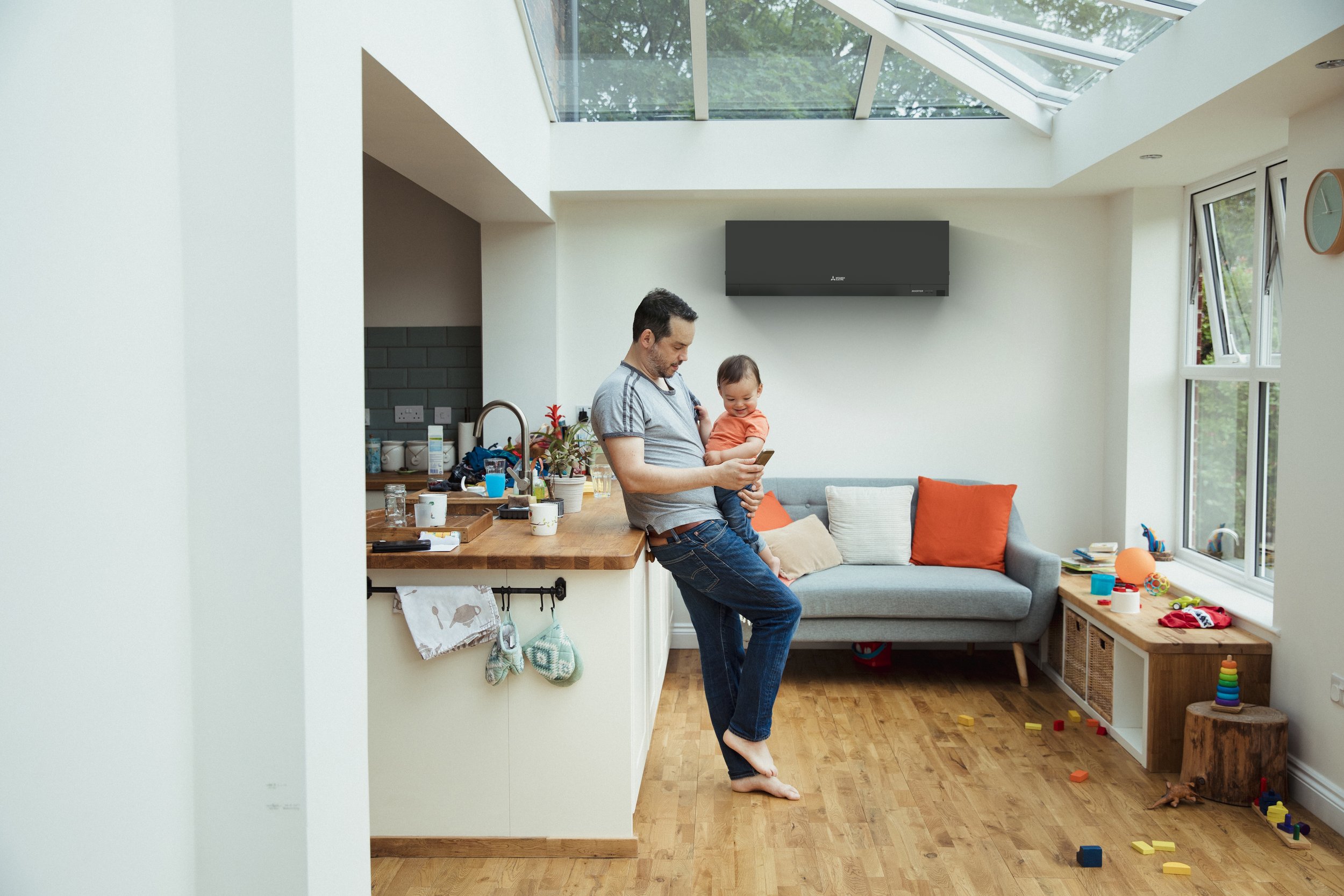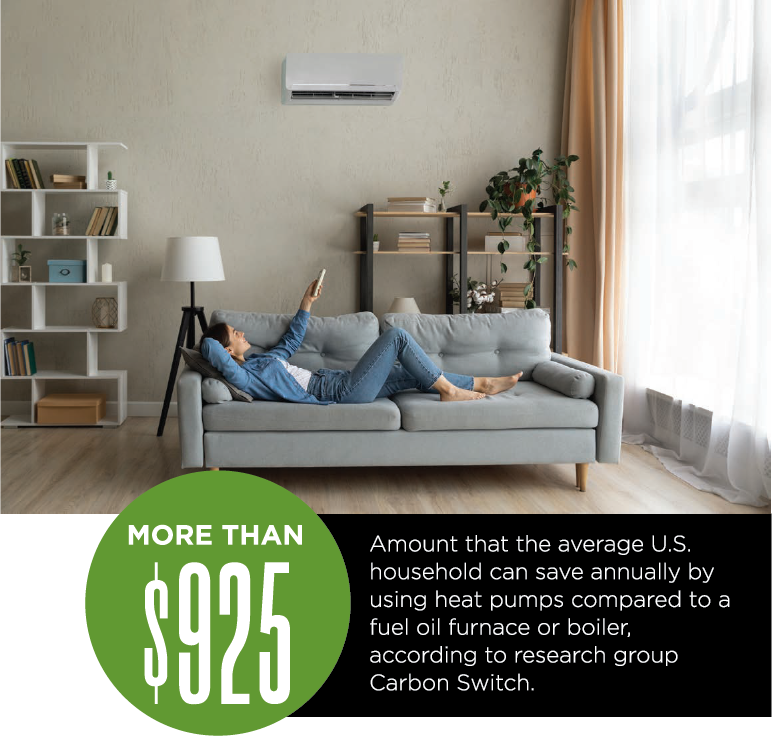Making the shift to whole-home heat pumps
By Justin R. Wolf
“Heat pumps won’t work in the cold!” This of course is untrue. Yet somehow, the disproven myth has persisted and influenced many homeowners into believing that their gas- or oil-powered furnace offers greater efficiency. Thankfully, as myths typically go, this one is yielding to reality.
Air-source heat pumps are efficient because they transfer thermal energy from outside air rather than generate heat through fuel combustion. And while heat pumps do result in a higher monthly electric bill, that difference can be more than offset by the savings of switching from fossil fuels. According to research group Carbon Switch, the average U.S. household can save more than $925 annually using heat pumps compared to a fuel oil furnace or boiler. More than 67% of Maine’s power generation mix currently comes from clean or relatively clean renewable sources, including hydropower, wind, biomass and solar; the state’s target is to reach 80% by 2030. On a holistic scale, this translates to better indoor air quality and lower emissions. By some estimates, if every home in the country had a heat pump, this would slash overall U.S. emissions by up to 9%. It’s no wonder that in the last three years, sales of heat pumps have consistently outpaced gas furnaces nationwide.
The industry consensus is that a single 18,000 BTU mini split will heat or cool between 550 and 650 square feet of space. But as Andy Meyer, senior program manager with Efficiency Maine, points out, “Sizing the heat pump isn’t the same as designing the heat pump. You might determine that a house needs, for example, 40,000 BTUs per hour, but that’s not the end of the discussion. Where will you put the heat pumps? Can you do it all from one unit for the whole house, or do you need one in every room? ... And don’t forget, heat rises.”
Why you may want to make the shift
Making the switch to a whole-home heat pump can yield many dividends, among them the income-driven rebates available through Efficiency Maine, ranging from 40–80% of the project costs, and the federal Energy Efficient Home Improvement, aka 25C tax credit (up to $2,000 annually), all on top of the annual energy savings.
Efficiency Maine recently changed their criteria for rebate eligibility. Rebates are available for whole-home heat pump systems, sized for at least 80% of the home’s peak heating load or 100% when combined with supplemental heat. The costs of single-zone heat pumps are eligible, but no longer for multizone (one compressor, multiple indoor mini-splits) or dual-fuel setups where a heat pump is combined with a boiler.
In the name of efficiency, cost and indoor comfort, opting for an efficient and affordable heat pump in place of fossil fuel combustion systems may be the right choice for your household. But since homes are complex systems, making the switch might impact other areas of your home. Here are some things to know.
Airtightness and insulation
Some newer heat pump models can maintain high efficiency capacity (roughly 70–80% or more) even when outside temperatures drop to -22°F, according to Efficiency Maine. However, that efficiency will be of little comfort to a homeowner with a leaky or poorly insulated home. And even with Governor Janet Mills’ successful push for widespread adoption of heat pumps across the state, including a new target of installing an additional 175,000 by 2027 (on top of the 100,000 installed at the end of 2023, two years ahead of schedule), it’s worth it for owners of older homes to gain a clearer picture of how (and where) air is moving throughout their home.
According to Richard Burbank, president of Evergreen Home Performance, a house must have “adequate airtightness and insulation” for a whole-home heat pump system to perform optimally. Burbank’s outlook reflects what’s known as the “envelope first” approach, which prioritizes proper air sealing and insulation before installing a heat pump.
Colin McCullough, owner of All-Around Home Performance, draws a clear distinction between insulation and air sealing, and rightfully so, since conflating the two can give homeowners misleading impressions of how well their home performs: “I’ve done blower door tests in plenty of houses that are well insulated but also leaky. And many of them have heat pumps, and people complain that they’re not working well.” The performance burden lies with the home and not the heat pump.
While heat pumps will work in any home, there are some conditions that will help them to reach their full potential. To test this out, McCullough elected to be his own guinea pig. A few years ago, he chose to install a heat pump in his 1915 farmhouse and then weatherize in stages so he could see what made the most difference. He had previously heated the 1,300-square-foot farmhouse with propane, which cost “about $600 per month in the winter.” With the introduction of a heat pump alone, “it couldn’t keep up on cold days” as the primary heat source, prompting him to revert to propane. The following winter, Mc- Cullough began work on the second floor, performing air sealing and swapping out the 3.5 inches of fiberglass batt with a higher R-value (aka insulating power) product in the walls and ceilings. This yielded better results, bringing heating costs down nearly 50%. “It was still expensive, but it could at least heat the space in winter,” McCullough says. Finally, he resealed and reinsulated the first floor, which brought his steepest electric bill to $138 per month and with zero reliance on propane. “I could see how much of a difference the air sealing and insulation made in my own home,” he says.
Moisture and ventilation
Airtightness and insulation are not the only factors to be aware of when making the switch. Burbank also warns about unintended consequences that can arise from installing a wholehome heat pump system without first addressing moisture and ventilation. “More basement air is now staying in the home,” he says, resulting in greater buildup of humidity and radon. “It takes roughly 11,500 gallons of air to combust 1 gallon of oil. So, you’ve replaced a furnace with a heat pump, which gives you a lot of distribution and BTU efficiency, but you’re no longer moving that air in the basement …. and your [fossil fuel] device may have been part of your radon mitigation.”
While basement humidity is rarely an issue in the winter, radon buildup can be. If the home isn’t already fitted with radon exhaust, it’s highly advisable to have it tested for radon after removing all active combustion devices from the basement.
As for the moisture mitigation, Meyer points out that a heat pump water heater in place of a boiler can assist with dehumidification, “but it doesn’t replace a good dehumidifier.” He also observes the importance of good ventilation, particularly above grade, and how taking the “envelope first” approach in a home with existing moisture issues can lead to problems. Mechanical ventilation systems that can deliver fresh air and exhaust stale air—notably in the form of an energy recovery ventilator (ERV) or heat recovery ventilator (HRV)—are ideal in such cases.
At the end of the day, introducing a whole house heat pump system may indeed require other efficiency or home performance upgrades that might not have been front of mind when deciding to make the switch. Should it become a question of sequencing, or even which steps are prerequisites versus electives, home efficiency experts and energy auditors are critical resources. Making the whole-home switch is a big decision, so you’ll want assurances that your investment delivers on its promise. Start with reviewing the rebate and tax incentives associated with making the switch. Then develop at least a basic understanding—or advanced, if you prefer—of how your home performs in terms of air movement and leaks, air quality and R-values. As Burbank points out, “The more efficient your home is, the more comfortable you’ll be in the long term.”
This article appeared in the Fall 2024 edition of Green & Healthy Maine HOMES. Subscribe today!
Find Maine experts that specialize in healthy, efficient homes in the Green Homes Business Directory.






